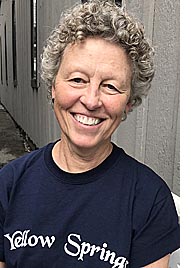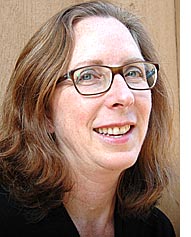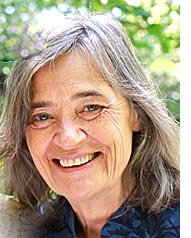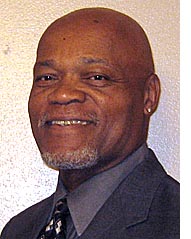Four mayoral candidates offer varied visions for position
- Published: October 19, 2017
This is the last in a series of articles featuring candidates for local office on Nov. 7. This article’s focus is the four candidates running for the seat of longtime mayor David Foubert.
Pam Conine
While the Yellow Springs mayor currently has two main functions — overseeing Mayor’s Court and performing ceremonial duties — candidate Pam Conine plans to add a third component to the job.
A retired teacher of 42 years, Conine wants to use the position to encourage local children and teens to become involved citizens.
“I’d like to use being mayor to find ways of getting our students to engage in the political process,” she said recently.
Conine would do so by making, at the teacher’s request, presentations to classes on the importance of civic participation. And as a certified reading specialist, she can also see herself helping young children who want to “read with the mayor,” to improve their skills, she said.
“I would connect again with our youth, use my professional skills as an educator to increase their agency,” she said.
Conine is also mindful of the mayor’s responsibility for Mayor’s Court, the local alternative to the Xenia Municipal Court.
“Mayor’s Court is a historically important part of the village, and many people consider it the most important part of the office,” she said. “I believe Mayor’s Court is very important to the citizens of Yellow Springs and I’ll do everything I can do to keep and support it as long as it’s of use to our village.”
Currently, about 300 small towns and villages in Ohio have a Mayor’s Court that allows the local mayor, or a magistrate, to adjudicate misdemeanor cases. The system allows towns to keep cases involving those charged with minor offenses in the community, rather than sending them to the larger county court system. However, Conine is aware that the Ohio Supreme Court has been critical of Mayor’s Courts in general, and especially those that operate without a prosecutor, as is the case of Yellow Springs. So changes may be coming, she said.
But the changes won’t be coming from her.
“Should I be elected, I won’t go out and start changing Mayor’s Court,” she said.
However, she will listen closely to suggestions from the Justice System Task Force, or JSTF, which has been researching ways to make the local Mayor’s Court more effective.
“I’ve been following the work of the task force, and I would initiate no changes to Mayor’s Court until careful reading and discussion of their recommendations,” she said.
Also aware of many villagers’ interest in giving Mayor’s Court more of a restorative justice slant, Conine plans to attend the symposium on the topic presented by Antioch College at the end of this month.
Restorative justice is a specific process that brings together an offender, the victim and community members, she said, a process that currently doesn’t fit with the structure of Mayor’s Court. However, Conine does favor using more restorative justice techniques in the court, including possibly creating a restorative justice team.
To the job, Conine would bring not only her skills as an educator, but several decades’ experience interacting with the youth, parents and grandparents of the village. She would also bring extensive community involvement, an even temperment and an eagerness to take the two-day required state training for new mayors.
“I’m a lifelong learner and love the process of gaining this knowledge,” she said.
In some ways, running for mayor is the culmination of Conine’s lifelong interest in the political process. As she grew up, her father was the county chair of a political party in northwest Ohio, and she remembers spirited discussions on current events at the family dinner table.
She went on to specialize in social studies during her teacher’s training, moving to Yellow Springs in 1979 as a Morgan (now McKinney) Middle School teacher. However, the school needed a special ed teacher, so she was hired with the understanding that she would pursue that training, which she did. Conine continued to keep current events in front of her students, and also helped to educate young people on the political process.
Following her 2009 retirement from the McKinney School, Conine went on to teach teachers at Antioch University Midwest. She retired from that job two years ago.
But she has a lot of energy, and running for mayor seems a good way to channel that energy, engage in the political process and give back to the town she loves, Conine said.
“We live in such a dynamic, diverse, socially responsible village. I do believe it’s a unique place,” she said. “I want to do all I can to preserve and nourish that while serving as Yellow Springs mayor.”
Laura Curliss
Local attorney Laura Curliss began thinking of running for mayor several years ago, after she took on a pro bono case involving a misdemeanor charge against a Yellow Springs resident. The case, like many, was heard in Xenia Municipal Court rather than Yellow Springs Mayor’s Court, even though there seemed no good reason why it had been sent to the larger court.
While felonies automatically go to the Xenia court, most misdemeanors can be heard either in the Mayor’s Court (if the officer charges the offense under the Village code) or Xenia (if the charge is under the Ohio Revised Code). While most misdemeanors were kept in the local court during the tenure of former Police Chief John Grote, under chiefs Anthony Pettiford and Dave Hale, officers began sending more cases to Xenia.
Recently, after Curliss made a public records request, she found that the numbers of Mayor’s Court cases have declined significantly in recent years.
“I was disturbed when looking at the cases, that so many were adjudicated in Xenia,” she said.
She believes that Mayor’s Court should be used whenever possible, because it’s far more convenient for local residents to attend court in their own town. And in the local court, the outcomes can be more creative and humanitarian than in the county court.
“If we have Mayor’s Court, we can have more alternative types of resolutions, depending on the case,” Curliss said.
For instance, situations in which a neighbor dispute has evolved into a crime could be sent to Village Mediation, a process that could result in improved relationships and greater understanding, unlike the simple fine that would likely be imposed in the Xenia Court.
And imposing alternative strategies such as mediation means the root of the behavior might be addressed, rather than just the imposing of a fine.
“Recidivism can be high if the core problem isn’t resolved,” Curliss said. “The more I looked into Mayor’s Court, I realized that so much more can be done.”
Curliss is interested in learning more about the potential for restorative justice strategies to be used in the local court, and plans to attend the symposium at the end of the month.
But she believes there are also problems with the local court, especially because it currently does not use a prosecutor. Almost all other Mayor’s Courts in Ohio have them, Curliss said.
She strongly advocates the hiring of a prosecutor (on a part-time basis) because currently, the mayor has to act as both prosecutor, deciding whether to move ahead with a case, and a judge, deciding the outcome. It’s unfair and difficult for the mayor to navigate both roles, she believes.
Curliss also believes that if the court doesn’t get more use from the community, the Village should not be paying the $60,000 yearly it spends to maintain the court.
“If we can’t bring the cases back to Yellow Springs, I’d be the first to advocate changing the charter” to eliminate the court, she said.
Curliss is the only attorney running for the position, and she believes that her legal expertise would help her run the court effectively. In most communities the mayors, or magistrates, do have a legal background, because they need familiarity with rules of evidence, criminal procedure and the Ohio Revised Code, she said. She doesn’t believe that the 12 hours of training a first-time mayor receives brings a new mayor up to speed.
And while she has the legal credentials, Curliss also believes she has the creativity and compassion necessary to dispense alternative sentences, such as the writing of reflection letters. Curliss said that asking an offender to reflect on why he or she committed the crime, and how it affected the community, could have significant effects.
“I think I can fairly and impartially apply the law, and also be creative about dispositions and sentences,” she said.
One judge in the Hamilton County municipal court requires that those charged with crimes do yoga in the courtroom before proceedings begin.
Would she consider such a practice?
“Yes. Absolutely!” she said.
Born in Clinton County, Curliss grew up in Blanchester. She attended the University of Notre Dame as an undergraduate, before receiving a law degree from the same school. She also holds a Master of Divinity degree from the Yale Divinity School.
Curliss came to Yellow Springs from Wilmington when former Village Manager Mark Cundiff announced he was leaving the job, and she applied to be interim manager. After getting the interim job, she was soon after appointed as permanent manager. She stayed in that position a year. Shortly after leaving the job, her husband, a hospice physician, unexpectedly died. She has a 21-year-old son.
Currently, Curliss runs a private practice out of her home, and she has done pro bono work for several high-profile local cases, including that of David Carlson, the former villager charged with a felony following the New Year’s Eve ball drop. That charge was later dropped to a misdemeanor.
“I believe I have the ability to help make things better at the Mayor’s Court, if the citizens want me,” she said.
Cathy Price
In most things, Cathy Price looks at the big picture. And to her, the big picture involves who we are as human beings, how we’re in relationship with each other and how we can live together in harmony.
While in her professional life Price chose a profession that requires strict attention to detail — she’s a pharmacist — in the rest of her life, she tends toward the spiritual, inspired by some aspects of Buddhism, Native American practices and the teachings of visionary meditation and personal growth teacher Richard Moss.
“I’ve had an eclectic lifestyle,” she said in a recent interview. “I’ve followed traditional science and alternative medicine, physics and metaphysics. I’ve followed the pulse of life in my own way, and I think that fits with Yellow Springs.”
Price would bring her big-picture focus to the job of mayor, she said. That is, she sees Mayor’s Court as an opportunity to engage and educate those who have stepped over the law in a way that strengthens their bond to the community. Having done so, she believes, they’re less likely to break the law in the future.
“If people feel a connection with each other, it’s more likely they’ll be mindful of our laws,” she said. “It’s the Golden Rule. You treat others as you want to be treated.”
In some Native American cultures, those who have transgressed are surrounded by a circle of tribal members who focus on the offender with love, she said, stating that in a small way Mayor’s Court could play such a role.
Price has been inspired by what she sees as the gentle spirit of longtime Mayor David Foubert, and would seek to continue that approach to offenders. She would look for creative and compassionate responses to those breaking the law, perhaps asking a person to write an essay on the effects of his behavior on the community or do volunteer work, rather than imposing a fine.
“I prefer not to take money,” she said. “I’d prefer to have people put mental and heartfelt effort into whatever brought them there.”
Aware that use of Mayor’s Court has declined in recent years and that more misdemeanor cases have been sent to the Xenia Municipal Court, Price said she would do what she could to turn that trend around.
“This is our local court. We should make use of it as much as possible,” she said.
Raised in the south, Price has always been interested in visionary topics. Getting ready to attend college, she wanted to study “the nature of reality,” but didn’t know whether to pursue philosophy, psychology, theology or something in the sciences. Her high school counselor suggested that, since she liked science, Price should get a degree in pharmacy, which would provide her a livelihood while she studied more heady topics in graduate school.
After graduating in pharmacy from the University of North Carolina, Price moved to Virginia, where she worked in hospitals and public clinics. She was especially drawn to working with patients in an educational setting, teaching them about how different medications affected their body. With greater understanding, they pursued healthier practices, she believes, and she also sees education as an important component of Mayor’s Court.
“There’s time for that in this court,” she said.
Price has three adult chiildren, the youngest of whom, Amy, graduated from Yellow Springs High School after the family moved to town in 1994. Around that time Price completed a three-year program in meditation and ontology taught by Richard Moss, and she has also studied and practiced the Alexander technique and biodynamic cranial therapy.
Along with Mayor’s Court, Price is keen to pursue the ceremonial duties of the local mayor, including officiating at weddings.
“It’s so joyous,” she said. “I’m pro-marriage. I love weddings.”
Most of all, she’d like the local Mayor’s Court to reflect the distinctive qualities of life in Yellow Springs.
“I want to do things in a Yellow Springs way,” she said.
Gerry Simms
Gerry Simms points to his father as a significant role model.
“He was always the type of person who said, ‘listen, listen, listen,’” Simms said recently. “He said, ‘don’t talk to hear yourself talk. State your opinion and then be quiet.’”
Simms has followed his father’s advice. Most recently as a two-term member of Viillage Council, his listening stance prompted some villagers to encourage Simms to run for the office of mayor.
Although initially worried that he lacked the law background to be head of the Mayor’s Court, Simms said he was reassured by Village Solicitor Chris Conard that he doesn’t need to be an attorney to be a good mayor.
“He said, you just need common sense and to be able to listen and make decisions,” Simms said.
Simms doesn’t share the concern of some other candidates that more local cases should be coming to Mayor’s Court. Yes, the number of local cases is small, but he believes this number reflects several trends. First, that local police are simply making fewer arrests then they once did, and second, that based on his recent analysis of parking violations, most local crime is caused by out-of-towners.
“That says to me that the vast majority of [local] citizens obey the laws,” he said.
Mayor’s Court has simply changed over time, he believes, and “there won’t be a lot of people coming before Mayor’s Court.”
However, he does see the mayor as having an important role in addressing those out-of-towners who end up in court.
“We have to get the word out that while we’re a tourist town, we’re a law-abiding town,” Simms said. “As mayor, I would talk to folks, make sure they know they need to respect the law.”
And regarding locals who end up in court, Simms believes that Mayor Foubert has been using restorative justice for years in his low-key approach. Simms supports Foubert’s approach, and like other candidates, plans to attend the end-of-month symposium on restorative justice.
“I hope many villagers attend,” he said, regarding using the strategy in the court. “We may come up with another way.”
Simms also supports hiring a prosecutor for Mayor’s Court.
“I feel the mayor can’t be both prosecutor and judge. The mayor should be independent.”
If he’s elected, Simms would make the mayor a more visible presence in town, he said, stating that he would attend an wide array of activities.
Simms also sees the mayor’s role as a sort of ambassador for Yellow Springs, reaching out to let people know of the positives of living here.
“The mayor should help promote the village as a walkable, friendly place to live. The mayor could get the word out that we need more business,” he said.
Retired after more than three decades at Wright Patterson, Simms grew up in a small town near Rochester, New York. After heading south to a University of Arkansas campus to play college football, Simms had his consciousness raised on a bus ride home. He had to sit at the back of the bus and when the bus stopped for lunch and other passengers entered a restaurant, he wasn’t allowed to enter.
“That experience had an impact on me,” he said. “I decided that if some day I could make a difference, I would.”
Simms transferred to Wilberforce, ending up with a degree in business management, after which he worked as a loan officer for a bank. Then he moved to Wright Patt, where he worked as a budget analyst with contractors for 30 years.
In Yellow Springs, Gerry and his late wife, Linda, raised two daughters. And even while working and raising a family, he was deeply involved in community life. As well as two terms on Council, he served two terms on the Yellow Springs school board. His list of civic engagement is long, including the Yellow Springs Community Foundation, the 365 Project, the steering committee of the 2010 visioning project, and the board of the Yellow Springs Community Children’s Center, along with other activities.
Through it all, Simms has maintained his love of the village.
“I’ve been here a long time,” he said. “I can’t think of a better place to be.”
Contact: dchiddister@ysnews.com
The Yellow Springs News encourages respectful discussion of this article.
You must login to post a comment.
Don't have a login? Register for a free YSNews.com account.















No comments yet for this article.